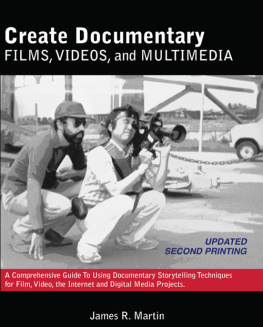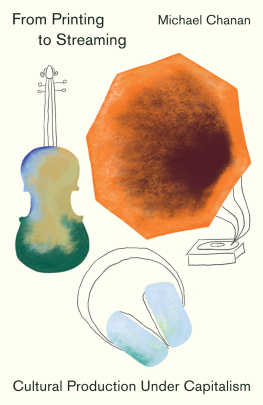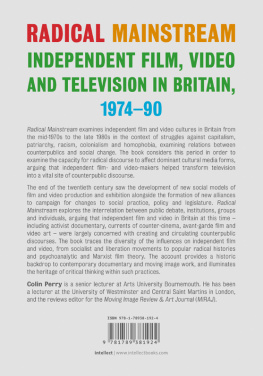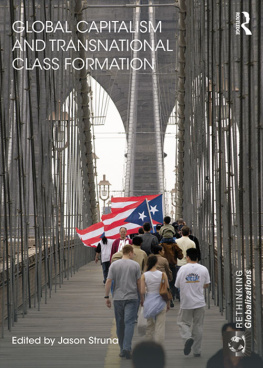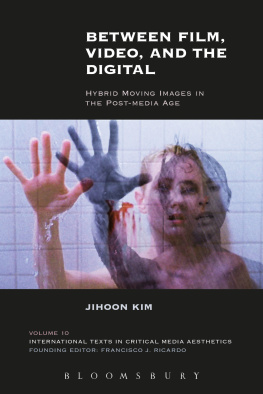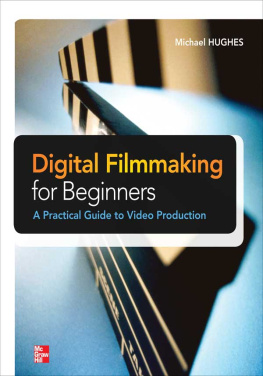Digital Media, Cultural Production and Speculative Capitalism
This collection of essays explores the interfaces between new information technologies and their impact on contemporary culture, and recent transformations in capitalist production. From a transnational frame, the essays investigate some of the key facets of contemporary global capitalism: the ascendance of finance capital and the increasing importance of immaterial labour (understood here as a post-Fordist notion of work that privileges the art of communication, affect, and virtuosity). The contributors address these transformations by exploring their relation to new digital media (You-Tube, MySpace, digital image and video technology, information networks, etc.) and various cultural forms including the Hispanic television talk show, indigenous video production, documentary film in Southern California, the Latin American stock market, German security surveillance, transnational videoconferencing, and Japanese tourists use of visual images on cell phones. The authors argue that the seemingly radical newness and alleged immateriality of contemporary speculative capitalism, turns out to be less dramatically new and more grounded in colonial/racial histories of both material and immaterial exploitation than one might at first imagine. Similarly, human interaction with digital media and virtuality, ostensibly a double marker for the contemporary and economically privileged subject, in fact reveals itself in many cases as transgressive of racial, economic and historical categories. This book was published as a special issue of Social Identities.
Freya Schiwy is Associate Professor at the University of California, Riverside. She teaches in the Media and Cultural Studies and in the Hispanic Studies Departments. Her current book project is titled Broadcasting Dissent. Community Media, Latin America, and the Politics of Aesthetics.
Alessandro Fornazzari is an Assistant Professor in the Department of Hispanic Studies at the University of California, Riverside. His area of specialisation is contemporary Latin American literature and culture, and recent research explores the intersections of culture and the economic text in the context of the Latin American neoliberal transitions.
Susan Antebi is Assistant Professor in the Department of Spanish and Portuguese at the University of Toronto. She works in the areas of contemporary Latin American cultural production and disability studies. Her current book project explores interfaces between eugenics and narrative aesthetics in twentieth century Mexico.
Digital Media, Cultural Production and Speculative Capitalism
Edited by
Freya Schiwy, Alessandro Fornazzari and Susan Antebi
First published 2011
by Routledge
2 Park Square, Milton Park, Abingdon, Oxon, OX14 4RN
Simultaneously published in the USA and Canada
by Routledge
711 Third Avenue, New York, NY 10017
Routledge is an imprint of the Taylor & Francis Group, an informa business
2011 Taylor & Francis
This book is a reproduction of Social Identities 15.3. The Publisher requests to those authors who may be citing this book to state, also, the bibliographical details of the special issue on which the book was based
All rights reserved. No part of this book may be reprinted or reproduced or utilised in any form or by any electronic, mechanical, or other means, now known or hereafter invented, including photocopying and recording, or in any information storage or retrieval system, without permission in writing from the publishers.
British Library Cataloguing in Publication Data
A catalogue record for this book is available from the British Library
ISBN13: 978-0-415-61449-8
Disclaimer
The publisher would like to make readers aware that the chapters in this book are referred to as articles as they had been in the special issue. The publisher accepts responsibility for any inconsistencies that may have arisen in the course of preparing this volume for print.
Contents
| Freya Schiwy, Susan Antebi and Alessandro Fornazzari |
| Susan Antebi |
| Freya Schiwy |
| Kenneth Rogers |
| M.D. Foster |
| Alessandro Fornazzari |
| John Namjun Kim |
| Silvia Meja Estvez |
Digital media, cultural production and speculative capitalism
This collection of essays explores the interfaces between new information technologies, their impact on contemporary culture, and recent transformations in capitalist production. From a transnational frame, the essays investigate some of the key facets of contemporary global capitalism: the relativization of a production based model of capital, the ascendance of finance capital, and the increasing importance of immaterial labor (understood here as a post-Fordist notion of work that privileges the art of communication, affect, and virtuosity). The contributors address these transformations by exploring their relation to new digital media (YouTube, MySpace, digital image and video technology, information networks, etc.) and various cultural forms including the Hispanic television talk show, indigenous video production, documentary film in Southern California, the Latin American stock market, German security surveillance, transnational videoconferencing, and Japanese tourists use of visual images on cell phones. These diverse analyses of cultural production and digital media itself a paradigmatic technology of global capitalism reveal persistent lines of continuity between the virtual and the material, as well as between contemporary and earlier cultures and economies (racial, colonial and imperial legacies). Engaging with recent critical debates on the intrinsic entanglement of the digital and the corporeal and its relation to the logic of global capitalism, the essays collected here offer profoundly transnational perspectives on how we can think about the possibilities for socio-cultural transformation in light of speculative capitalism and the new information and communication technologies.
The essays are the outcome of two years of intense collective debate. Our conversations began in the fall of 2005 in an interdisciplinary and post-area studies faculty research group sponsored by the University of California Riversides Center for Ideas and Society. At the Center, six of the contributors came together to exchange perspectives on the impact and articulation of digital technologies and speculative capitalism in different contexts: Latin America, Japan, and the USA. Theoretically this conversation brought together the Autonomia perspective on the changing face of capitalism (Mario Tronti, Mauricio Lazzarrato, and Antonio Negri among others) with recent scholarship on digital media (Mark Poster, Katherine Hayles, and Mark Hansen).
Autonomia thinkers have emphasized a historically specific rise of immaterial labor with respect to other forms of labor that corresponds to the current global capitalist economy. This shift, which in the broadest terms corresponds to the passage from secondary (industrialization) to tertiary (informatization) capitalist accumulation, puts the focus on the productive potential of immaterial labor qualities such as flexibility, creativity, innovation, knowledge, communication, and affect. A question that arises from immaterial labors coming into dominance is whether it undermines anti-capitalist projects that have focused on the production of affect as the ground for the constitution of alternative collective subjectivities. The risk of this structure is complete servitude to a capitalism in which work and intellect, material and immaterial labor, production and consumption have become indistinguishable from one another. Its potential for a politics of liberation seems to lie in a social creativity that transcends class hierarchies, as Mauricio Lazzarrato has written; or, following Paulo Virnos argument, in the radical separation or exodus of intellect from work; or, more recently, in Hardt and Negris revolutionary subject known as the multitude. These proposals share the view that an outside is no longer possible and that social transformation must be generated and become operative from within.


